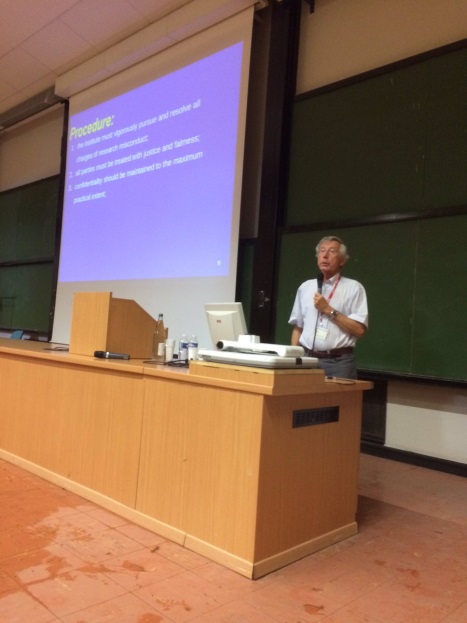
The meeting began with an impressive talk from Luc Soler (IRCAD, France) who explained how advances in technology were bringing about a revolution in minimally invasive surgery using augmented reality which is happening now!
After an inspiring opening it was down to business the next day with the core theme of the conference being ‘Scientific Integrity – Editors on the front line’.
Lex Bouter (VU University Amsterdam) gave a plenary lecture on selective reporting and the reproducibility crisis. He described the spectrum of issues that can occur from honest error, sloppy research, poor reproducibility, right through to questionable research practice, plagiarism and outright fraud.
He likened questionable research practices to ‘60 shades of grey’ and explained that their impact on science could be more pervasive than research misconduct itself (as that’s usually more obvious and containable). He speculated on the causes of questionable research practices suggesting they resulted from a combination of “the system” (publication pressure and high levels of competition), “the culture” (inappropriate role models and insufficient mentoring) and “the individual” (justifying misbehaviour).
“There are no easy solutions but accepting the complexity may at least help to understand what it is that needs to be solved. Could we change the incentive structure to reward authors for more than merely being published in a journal?”
Ginny Barbour
Chair COPE, April 2016, From The Ethics Centre
Ginny Barbour, Chair of COPE, has likened such issues in research publication ethics to a ‘Wicked Problem’ (see her blog at the Ethics Centre) i.e. a class of problems with no easy solutions.
Research and publication ethics was touched on repeatedly during various sessions in the conference from detecting potential misconduct via screening of text and images, to reducing waste in research and publishing.
Handling cases of misconduct was also the focus of a parallel session organised by Mirjam Curno (Frontiers, COPE Council Member). The Publisher role in this and how they could best help, support and educate Editors was discussed by Elizabeth Moylan, (BioMed Central).
We heard from Matt Hodgkinson (PLOS) who gave tips and advice on how Editors could act when faced with a public issue. We also learnt about the ‘dos and don’ts’ of whistleblowing from Christiaan Sterken (University of Brussels, EASE Council Member), while Lex Bouter explained the issues faced by ‘whistle blowers’ in science, and measures institutions could adopt.

It seems that the feeling from the meeting, echoing findings from elsewhere, is that there is an urgent need to redesign the ‘reward system’ in science and recognize other activities that researchers do – such as mentoring PhD students and sharing data (for example) – rather than the mere act of publishing in a journal.
Any decisions and changes should be based on evidence though, and we hope to encourage and foster the research through our new journal, Research Integrity and Peer Review.
Examples of this kind of research were presented at the PEERE session. Flaminio Squazzoni (University of Brescia, Italy) assessed the cost of transparency by modelling the investment of resources and bias in double-blind and open peer review, Bahar Mehmani (Elsevier) discussed peer review innovations and reviewer recognition. Michael Willis (Wiley) presented the results of Wiley’s peer review survey on perception of training needs for reviewers, and Ana Marušić (University of Split) shared a protocol for a systematic review on peer review and motivation.
Following the tweeting at #EASEStras gave a taste of what was going on in parallel sessions. Certainly, the other plenary sessions from Michelle Bergadaa (University of Geneva) on plagiarism and the characteristics of plagiarists, and Boris Barbour (IPENS, Paris) on the role of PubPeer and his motivation for setting up the site provoked much discussion.
In addition to the sessions, 12 posters were presented during a working lunch. The wide range of topics included supporting authors in science writing, surveying reviewers, exploring attitudes to misconduct and auditing journals for adherence to editorial policy and peer review (the last one by Maria Kowalczuk presenting a new process for BioMed Central journals).
I think we would all agree that publishers, editors, peer reviewers, institutions and researchers all have a collective responsibility to foster best practices and ensure the integrity of the published literature. Thank you to the conference organizers for a stimulating and varied programme.
Comments